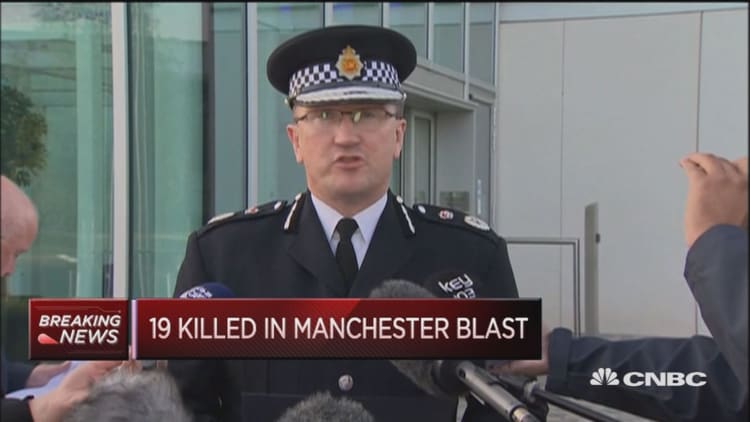
Monday's suspected suicide attack on Manchester Arena was likely yet another lone-wolf incident rather than the work of international terror networks, according to one political analyst.
No details are known about the identities of parties involved in an explosion that has killed 22 people and injured at least 59. However, U.K. and U.S. officials said they may have tentatively identified the bomber, according to NBC News.
"It is highly unlikely that this is part of some coordinated attack from overseas," Richard Fenning, global CEO at political consultancy Control Risks, told CNBC.
Ian Hopkins, chief constable of the Greater Manchester Police, said Tuesday that police believe the attack was carried out by one man who had an improvised explosive device and who also died in the bombing. He added that the priority was to establish whether he was acting alone or as part of a network.
Recent attacks on European soil reveal the development of self-radicalized individuals, as reflected by the Westminster Bridge incident, Fenning explained. These people have chosen to duck below society's radar, got personal issues that lead them to self-alienation as well as a willingness to inflict serious violence, he continued.
"The nature of modern terror attacks in Europe is entirely sporadic in what motivates people to do it."
Still, the extent of strategic planning behind the explosion at one of Europe's largest indoor stadiums was impressive, pointed out another analyst.
"The actual placement of the suicide bomber or device was put there with a specific intent to kill so this was a well-thought out plan," Fred Burton, chief security officer at Stratfor and former U.S. State Department counter-terrorism agent, told CNBC. "This was a certainly a very successful operation from the eyes of whoever carried this off."
Supporters of the Islamic State on social media had erupted into celebration following the news, said SITE Intelligence Group, a non-governmental counter-terrorism organization.
What's needed going forward
Law enforcement officials must now rely on forensic investigations to figure out the type of explosive device used and deduce the bomb-maker's identity, Burton noted, adding that multiple parties may be involved.
Until officials locate the culprit, they won't know whether there are other suicide vests are out there, he continued.
Confirming the bomb-maker's gender could also be of critical help, Burton added. "Based on my experience, that will help nail down the last 24 hours of that person's life and more importantly, that person's networks."
More broadly, lone-wolf attacks tend to be harder for authorities to predict and prevent, warned Fenning.
If this incident was part of a coordinated structure, intelligence services can gather data and eventually penetrate those networks, he explained. "But without that, it is almost impossible for them to stop everything."
Going forward, the international community can certainly expect more terror attacks, warned Anne Speckhard, a Georgetown University psychiatry professor involved in counter-terrorism research projects.
As the Islamic State, or ISIS, loses territory and with Ramadan approaching, militants may want to show their strength, she said in e-mailed comments.

